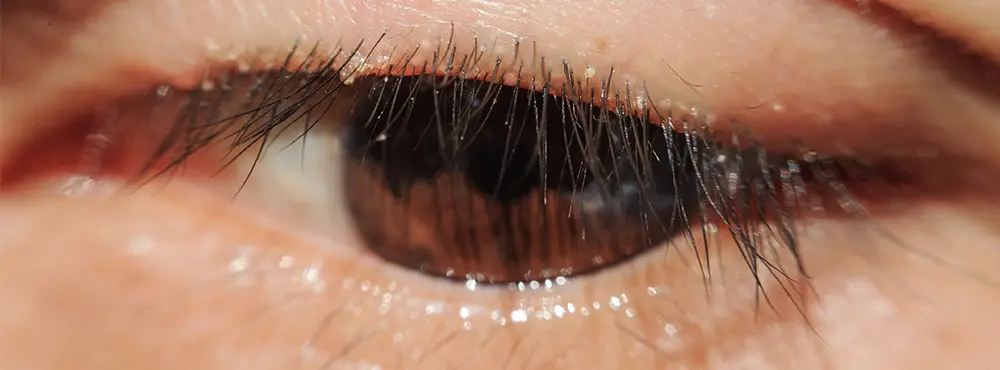What is blepharitis?
Blepharitis is an inflammation of the eyelids, a common eye condition which affects both eyes.
It usually occurs on the part of the eyelid where the eyelashes grow, and as a result, eyelids will feel itchy and have a reddish-pink appearance. The condition is most often the result of oil glands at the base of the eyelashes becoming blocked or bacterial infections. Alternatively, in some cases, it is the result of allergies.
Blepharitis isn’t contagious; however, it is a chronic condition that causes discomfort. While treatment for blepharitis is not simple, the situation is not severe enough to cause vision loss.
What are the symptoms of blepharitis?
Symptoms may include:
- A burning sensation in the eyes
- Itchy eyelids
- swollen eyelids
- sore eyes
- Red eyelids
- Increased eye sensitivity
- The feeling of eyelids sticking together
- Crusting at the roots of the lashes
- Dry eyes
- The condition typically affects both eyes, but one eye can be much more affected than the other.
What is the main cause of blepharitis?
Disturbance in the amount of oils produced by the eyelid margin is the main cause of blepharitis, sometimes in association with poor apposition of the eyelid to the globe. Other associations include:
- Parasitic infections-such as eyelash mites
- Rosacea
- Herpes simplex dermatitis
- Contact dermatitis
These are just a few of the conditions that can lead to blepharitis.
Anterior blepharitis
This type causes the base of your lashes to become inflamed and is the result of one of two things: staphylococcus bacteria or seborrhoeic dermatitis.
Posterior blepharitis
The Meibomian glands sit behind the base of your lashes, along the lid margins of the eyes. Posterior blepharitis affects the Meibomian organs due to inflammation, usually by debris and skin flakes, causing a blockage.
Mixed blepharitis
Mixed blepharitis is a combination of both anterior and posterior blepharitis.
Can blepharitis cause blindness?
Blepharitis cannot cause blindness; however, it can lead to other problems if not treated. Such issues can include the following:
Troublesome lashes
In more severe cases of blepharitis, you may experience your eyelashes growing in different directions or falling out altogether.
Excess tearing
Oily secretions and flaking can build up in your tear film and interfere with the natural lubrication of your eyes, causing dry eyes and excessive tearing as a result.
Problems wearing contact lenses
You might find wearing contact lenses uncomfortable due to dry eyes caused by blepharitis.
Conjunctivitis
Blepharitis can lead to conjunctivitis or pink eye reoccurring regularly.
Skin problems on the Eyelids
Long-term blepharitis can cause the edges of the eyelid to turn inwards or outwards. Scarring on the eyelid can also result from the condition.
Stye
Styes are infections that develop at the base of the lashes and result in painful, visible lumps on the eyelid.
Chalazion
A chalazion is a small lump that develops inside of the eyelid as a result of the meibomian gland getting blocked.
Injury to the cornea
Blepharitis can sometimes spread to the cornea, causing corneal infections and ulcers to develop.
Does blepharitis go away?
Unfortunately, for most people, blepharitis is a long-term condition. Sufferers will experience repeated episodes, separated by periods without symptoms. However, there are some things you can do to combat the symptoms and offer relief for your eyes.
What is the fastest way to cure blepharitis?
You cannot cure blepharitis; however, you can treat blepharitis and keep the symptoms at bay by following a simple eyelid cleaning routine.
While the symptoms of blepharitis are still present, you shouldn't wear contact lenses or eye makeup.
Blepharitis treatment
Blepharitis can also be treated using a warm compress which can help to relieve the symptoms. This is advised in addition to following a daily eyelid-cleaning routine.
Using a Warm Compress
A warm compress will make the oil produced by the glands around the eye’s breakdown. It is advisable to place the warm compress over closed eyelids and leave it for approximately 10 minutes. You should consult your eye care practitioner regarding how many times a day you should do this.
You can make a warm compress by filling a ‘hot-water-bottle’ with warm, not scalding, water.
Alternatively, you can buy a compress such as our Thera-Pearl Eye Mask. This compress can be heated up in the microwave for 15 seconds to treat blepharitis. The small pearls in the mask can retain heat for long periods and soothe the eyes.
How to clean your eyes
Taking care to clean your eyelids regularly is essential for treating blepharitis. To clean your eyes adequately, you should follow the steps below:
- Wash your hands thoroughly
- Use diluted baby shampoo and a cotton wool pad to gently clean your eyelids, wiping your eyelashes and lid margin.
- Rinse with warm water
- Using a fresh cotton wool pad or clean towel, repeat this process for the other eye. Cleaning your eyelids every day is the best way to prevent a build-up of bacteria and stop blepharitis from coming back frequently.
When to see a doctor
If this doesn't reduce your symptoms, then it's highly advisable to visit your GP or eye care professional, who may prescribe you antibiotic eye drops. If these don't work after six weeks, they may suggest antibiotic tablets
Once blepharitis has been treated, you can continue to wear your contact lenses again. However, you may want to consider switching to daily disposable contact lenses as they are a more hygienic wearing option and pose a lower risk of experiencing problems related to blepharitis.
Quick links:
How to use eye drops
Do I need an eye test?
A Guide to Dry Eye
Disclaimer: The advice in this article is for informational purposes only and does not replace medical care or an in-person check-up. Please check with an eyecare professional before purchasing any products or remedies. For information on our article review process, please refer to our Editorial Policy.

 Offers
Offers Account
Account
 Favorite
Favorite
 Basket
Basket

 OFFERS
OFFERS
















